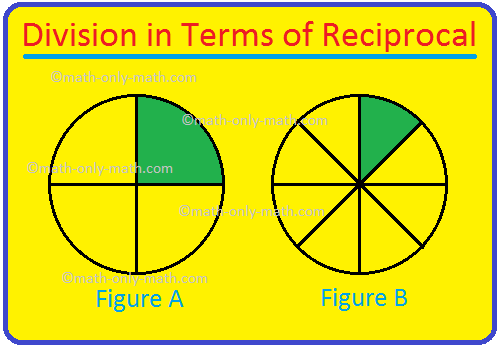Subscribe to our ▶️ YouTube channel 🔴 for the latest videos, updates, and tips.
Division in Terms of Reciprocal
We will learn division in terms of reciprocal.
Let us divide \(\frac{1}{4}\) into 2 parts. In the following figure A the colored part represents \(\frac{1}{4}\) of the whole figure. Now, we divide each part into two equal parts. The colored part in the figure B represents \(\frac{1}{8/}\).
Therefore, \(\frac{1}{4}\) ÷ 2 is equal to \(\frac{1}{8}\). We know that the reciprocal or the multiplicative inverse of 2 is \(\frac{1}{2}\).
So, if we multiply \(\frac{1}{4}\) by the reciprocal of 2, we get \(\frac{1}{4}\) × \(\frac{1}{2}\) = \(\frac{1}{8}\).
To divide a fraction or a whole number by a fraction or a whole number, we multiply the reciprocal of the divisor.
Solved Examples on Division in Terms of Reciprocal:
1. Divide 15 by \(\frac{3}{7}\)
Solution:
Reciprocal of \(\frac{3}{7}\) is \(\frac{7}{3}\). Thus 15 ÷ \(\frac{3}{7}\) = \(\frac{15}{1}\) × \(\frac{7}{3}\) = \(\frac{105}{3}\) = 35
2. Divide \(\frac{4}{9}\) by 8
Solution:
\(\frac{4}{9}\) ÷ 8 = \(\frac{4}{9}\) ÷ \(\frac{8}{1}\)
= \(\frac{4}{9}\) × \(\frac{1}{8}\)
= \(\frac{4}{72}\)
= \(\frac{1}{18}\)
3. Divide 13\(\frac{3}{5}\) by 13
Solution:
We first convert the mixed number into improper fraction.
13\(\frac{3}{5}\) = \(\frac{13 × 5 + 3}{5}\) = \(\frac{68}{5}\)
Now, \(\frac{68}{5}\) ÷ 13 = \(\frac{68}{5}\) ÷ \(\frac{13}{1}\)
= \(\frac{68}{5}\) × \(\frac{1}{13}\)
= \(\frac{68}{65}\)
= 1\(\frac{3}{65}\)
4. Divide 4\(\frac{1}{2}\) by \(\frac{3}{4}\)
Solution:
We first convert the mixed number into improper fraction.
4\(\frac{1}{2}\) = \(\frac{4 × 2 + 1}{2}\) = \(\frac{9}{2}\)
Now, \(\frac{9}{2}\) ÷ \(\frac{3}{4}\) = \(\frac{9}{2}\) × \(\frac{4}{3}\)
= \(\frac{36}{6}\)
= 6
5. How many pieces measuring \(\frac{5}{6}\) m can be cut from a thread of length 150 m?
Solution:
Length of one piece = \(\frac{5}{6}\) m
Length of the thread = 150 m
Number of pieces = 150 ÷ \(\frac{5}{6}\)
= 150 × \(\frac{6}{5}\)
= 180
Questions and Answers on Division in Terms of Reciprocal:
I. Fill in the blanks:
(i) \(\frac{3}{16}\) ÷ 1
(ii) \(\frac{8}{15}\) ÷ \(\frac{15}{8}\)
(iii) \(\frac{5}{9}\) ÷ \(\frac{1}{9}\)
(iv) \(\frac{3}{10}\) ÷ \(\frac{12}{10}\)
(v) 5 ÷ \(\frac{20}{7}\)
(vi) \(\frac{15}{8}\) ÷ 45
(vii) \(\frac{11}{21}\) ÷ \(\frac{33}{28}\)
(viii) \(\frac{2}{9}\) ÷ \(\frac{16}{27}\)
(ix) \(\frac{5}{2}\) ÷ \(\frac{25}{18}\)
Answers:
(i) \(\frac{3}{16}\)
(ii) \(\frac{64}{225}\)
(iii) 5
(iv) \(\frac{1}{4}\)
(v) \(\frac{7}{4}\)
(vi) \(\frac{1}{24}\)
(vii) \(\frac{4}{9}\)
(viii) \(\frac{3}{8}\)
(ix) \(\frac{9}{5}\)
II. Word Problems on Division in Terms of Reciprocal:
1. 7\(\frac{1}{2}\) liter of milk has to be packed in bottles of \(\frac{3}{4}\) liters. How many bottles are required to fill all the milk?
Answer: 10 bottles
2. 12\(\frac{1}{2}\) m of cloth is required to stitch 1 shirt. How many shirts can be stitched from a cloth of length 75 m?
Answer: 6 shirts
3. A car covers 30\(\frac{5}{6}\) km in 1 hour. How much time will the car take to cover 360 km?
Answer: 11\(\frac{25}{37}\) hours
From Division in Terms of Reciprocal to HOME PAGE
Didn't find what you were looking for? Or want to know more information about Math Only Math. Use this Google Search to find what you need.



New! Comments
Have your say about what you just read! Leave me a comment in the box below. Ask a Question or Answer a Question.